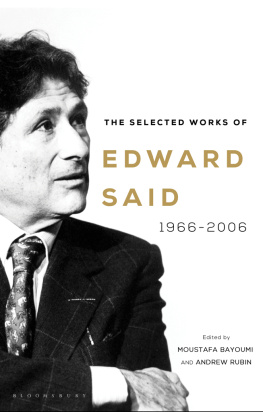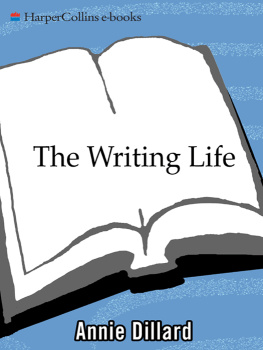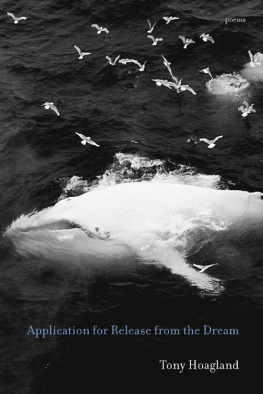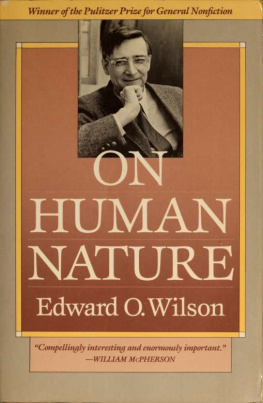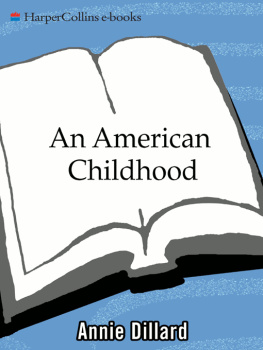Edward Hoagland - On Nature: Selected Essays
Here you can read online Edward Hoagland - On Nature: Selected Essays full text of the book (entire story) in english for free. Download pdf and epub, get meaning, cover and reviews about this ebook. year: 2014, publisher: Lyons Press, genre: Detective and thriller. Description of the work, (preface) as well as reviews are available. Best literature library LitArk.com created for fans of good reading and offers a wide selection of genres:
Romance novel
Science fiction
Adventure
Detective
Science
History
Home and family
Prose
Art
Politics
Computer
Non-fiction
Religion
Business
Children
Humor
Choose a favorite category and find really read worthwhile books. Enjoy immersion in the world of imagination, feel the emotions of the characters or learn something new for yourself, make an fascinating discovery.

- Book:On Nature: Selected Essays
- Author:
- Publisher:Lyons Press
- Genre:
- Year:2014
- Rating:4 / 5
- Favourites:Add to favourites
- Your mark:
- 80
- 1
- 2
- 3
- 4
- 5
On Nature: Selected Essays: summary, description and annotation
We offer to read an annotation, description, summary or preface (depends on what the author of the book "On Nature: Selected Essays" wrote himself). If you haven't found the necessary information about the book — write in the comments, we will try to find it.
Annie Dillard observes The best of Edward Hoagland is the best in the land. Now, in a beautiful new hardcover edition, signed by the author, and including new material, comes the best observations on nature by the finest essayist of our time.
On Nature: Selected Essays — read online for free the complete book (whole text) full work
Below is the text of the book, divided by pages. System saving the place of the last page read, allows you to conveniently read the book "On Nature: Selected Essays" online for free, without having to search again every time where you left off. Put a bookmark, and you can go to the page where you finished reading at any time.
Font size:
Interval:
Bookmark:
EDWARD HOAGLAND (BORN DECEMBER 21, 1932, IN NEW YORK, NEW York) is an author best known for his nature and travel writing. His nonfiction has been widely praised by writers such as John Updike, who called him the best essayist of my generation, and Joyce Carol Oates: Our Chopin of the genre.
Hoagland joined the Ringling Bros. and Barnum & Bailey Circus in 1951 and sold a novel about this experience, Cat Man, before graduating from Harvard in 1954. After serving two years in the Army, he published The Circle Home, a novel about the boxing world of New York. Soon after, he took the first of his nine trips to Alaska and British Columbia. During the 1970s he made the first two of his five trips to Africa. After receiving two Guggenheim Fellowships, he was elected to the American Academy of Arts and Letters in 1982. He is also a member of the American Academy of Arts and Sciences.
Mr. Hoagland has taught at The New School, Rutgers, Sarah Lawrence, CUNY, the University of Iowa, U.C. Davis, Columbia University, Beloit College, Brown, and Bennington, beginning in 1963 and retiring in 2005.
TURTLES ARE A KIND OF BIRD WITH THE GOVERNOR TURNED LOW. WITH the same attitude of removal, they cock a glance at what is going on, as if they need only to fly away. Until recently they were also a case of virtue rewarded, at least in the town where I grew up, because, being humble creatures, there were plenty of them. Even when we still had a few bobcats in the woods the local snapping turtles, growing up to forty pounds, were the largest carnivores. You would see them through the amber water, as big as greeny wash basins at the bottom of the pond, until they faded into the inscrutable mud as if they hadnt existed at all.
When I was ten I went to Dr. Greens Pond, a two-acre pond across the road. When I was twelve I walked a mile or so to Taggarts Pond, which was lusher, had big water snakes and a waterfall; and shortly after that I was bicycling way up to the adventuresome vastness of Mud Pond, a lake-sized body of water in the reservoir system of a Connecticut city, possessed of cat-backed little islands and empty shacks and a forest of pines and hardwoods along the shore. Otters, foxes, and mink left their prints on the bank; there were pike and perch. As I got older, the estates and forgotten back lots in town were parceled out and sold for nice prices, yet, though the woods had shrunk, it seemed that fewer people walked in the woods. The new residents didnt know how to find them. Eventually, exploring, they did find them, and it required some ingenuity and doubling around on my part to go for eight miles without meeting someone. I was grown by now, I lived in New York, and thats what I wanted on the occasional weekends when I came out.
Since Mud Pond contained drinking water I had felt confident nothing untoward would happen there. For a long while the developers stayed away, until the drought of the mid-1960s. This event, squeezing the edges in, convinced the local water company that the pond really wasnt a necessity as a catch basin, however; so they bulldozed a hole in the earthen dam, bulldozed the banks to fill in the bottom, and landscaped the flow of water that remained to wind like an English brook and provide a domestic view for the houses which were planned. Most of the painted turtles of Mud Pond, who had been inaccessible as they sunned on their rocks, wound up in boxes in boys closets within a matter of days. Their footsteps in the dry leaves gave them away as they wandered forlornly. The snappers and the little musk turtles, neither of whom leave the water except once a year to lay their eggs, dug into the drying mud for another siege of hot weather, which they were accustomed to doing whenever the pond got low. But this time it was low for good; the mud baked over them and slowly entombed them. As for the ducks, I couldnt stroll in the woods and not feel guilty, because they were crouched beside every stagnant pothole, or were slinking between the bushes with their heads tucked into their shoulders so that I wouldnt see them. If they decided I had, they beat their way up through the screen of trees, striking their wings dangerously, and wheeled about with that headlong magnificent velocity to locate another poor puddle.
I used to catch possums and black snakes as well as turtles, and I kept dogs and goats. Some summers I worked in a menagerie with the big personalities of the animal kingdom, like elephants and rhinoceroses. I was twenty before these enthusiasms began to wane, and it was then that I picked turtles as the particular animal I wanted to keep in touch with. I was allergic to fur, for one thing, and turtles need minimal care and not much in the way of quarters. Theyre personable beasts. They see the same colors we do and they seem to see just as well, as one discovers in trying to sneak up on them. In the laboratory they unravel the twists of a maze with the hot-blooded rapidity of a mammal. Though they cant run as fast as a rat, they improve on their errors just as quickly, pausing at each crossroads to look left and right. And they rock rhythmically in place, as we often do, although they are hatched from eggs, not the womb. (A common explanation psychologists give for our pleasure in rocking quietly is that it recapitulates our mothers heartbeat in utero.)
Snakes, by contrast, are dryly silent and priapic. They are smooth movers, legalistic, unblinking, and they afford the humor which the humorless do. But they make challenging captives; sometimes they dont eat for months on a point of orderif the light isnt right, for instance. Alligators are sticklers too. Theyre like war-horses, or German shepherds, and with their bar-shaped, vertical pupils adding emphasis, they have the ide fixe of eating, eating, even when they choose to refuse all food and stubbornly die. They delight in tossing a salamander up towards the sky and grabbing him in their long mouths as he comes down. Theyre so eager that they get the jitters, and theyre too much of a proposition for a casual aquarium like mine. Frogs are depressingly defenseless: that moist, extensive back, with the bones almost sticking through. Hold a frog and youre holding its skeleton. Frogs tasty legs are the staff of life to many animalsherons, raccoons, ribbon snakesthough they themselves are hard to feed. Its not an enviable role to be the staff of life, and after frogs you descend down the evolutionary ladder a big step to fish.

Turtles cough, burp, whistle, grunt and hiss, and produce social judgments. They put their heads together amicably enough, but then one drives the other back with the suddenness of two dogs who have been conversing in tones too low for an onlooker to hear. They pee in fear when theyre first caught, but exercise both pluck and optimism in trying to escape, walking for hundreds of yards within the confines of their pen, carrying the weight of that cumbersome box on legs which are cruelly positioned for walking. They dont feel that the contest is unfair; they keep plugging, rolling like sailorly soulsa bobbing, infirm gait, a brave sea-legged momentum stopping occasionally to study the lay of the land. For me, anyway, they manage to contain the rest of the animal world. They can stretch out their necks like a giraffe, or loom underwater like an apocryphal hippo. They browse on lettuce thrown on the water like a cow moose which is partly submerged. They have a penguins alertness, combined with a build like a Brontosaurus when they rise up on tiptoe. Then they hunch and ponderously lunge like a grizzly going forward.
Baby turtles in a turtle bowl are a puzzle in geometrics. Theyre as decorative as pansy petals, but they are also self-directed building blocks, propping themselves on one another in different arrangements, before upending the tower. The timid individuals turn fearless, or vice versa. If one gets a bit arrogant he will push the others off the rock and afterwards climb down into the water and cling to the back of one of those he has bullied, tickling him with his hind feet until he bucks like a bronco. On the other hand, when this same milder-mannered fellow isnt exerting himself, he will stare right into the face of the sun for hours. What could be more lionlike? And hes at home in or out of the water and does lots of metaphysical tilting. He sinks and rises, with an infinity of levels to choose from; or, elongating himself, he climbs out on the land again to perambulate, sits boxed in his box, and finally slides back in the water, submerging into dreams.
Font size:
Interval:
Bookmark:
Similar books «On Nature: Selected Essays»
Look at similar books to On Nature: Selected Essays. We have selected literature similar in name and meaning in the hope of providing readers with more options to find new, interesting, not yet read works.
Discussion, reviews of the book On Nature: Selected Essays and just readers' own opinions. Leave your comments, write what you think about the work, its meaning or the main characters. Specify what exactly you liked and what you didn't like, and why you think so.


